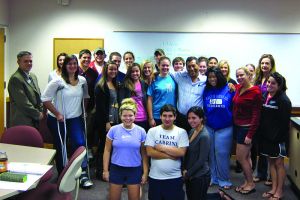
Fair Trade, one of the most popular justice movements hitting our society, came to life for students when they met a Fair Trade farmer in their class recently. Before the class, students had learned the process of Fair Trade and the benefits of buying these fairly-made products. A farmer associated with Catholic Relief Services came to campus and shared his personal story to classes on Sept. 16.
Rigoberto Contreras Díaz a Mexican coffee farmer from Santa Rosa, Oaxaca, said his life was transformed after his village implemented coffee cooperatives that have now been around for 25 years. The indigenous people of this village have found extensive growth and success through Fair Trade production.
Within the Yeni Navan cooperative, 800 members hold jobs and make a profitable earning. The co-op consists of 70 percent of men and 30 percent of women. Díaz explained that his village now has a sustainable reputation and now helps establish newer co-ops.
In Spanish, “This is a special market that costs more. We want to make sure it is quality. It is important to us,” Díaz said.
Producer-consumer relationships have made the Fair Trade movement successful, eliminating the middlemen and the conventional market.
“Fair Trade is the future,” Díaz said.
Because of these economic advancements, Díaz’s village can now provide better schooling, better nutritional food and better homes. Without proper production the lives of these natives would not be advancing out of poverty. To be recognized as Fair Trade makes their coffee more prestigious. Certification takes two years to complete, while renewal is completed each year to assure quality.
“I was able to buy my children a bicycle. When I was younger I died for one. Instead I was given playing dice,” Díaz said.
Díaz has been able to provide a safe lifestyle for his children and hopes to strive for security and a break out of poverty.
Small groups of Mexican farmers are coming together to advance and enhance stronger businesses. Mexico is made up of a half a million farmers, with only a small percentage certified Fair Trade. Through the regulations of Fair Trade, 70 percent of earnings go directly to the farmer while the other 30 percent are given back to the community.
“The visit of Rigoberto Contreras Díaz was the culmination of our discussions on Fair Trade. His explanation on how cooperatives are structured in the state of Oaxaca in Southern Mexico helped us understand how vitally important was the individual commitment of each member of these organizations in their efforts to adapt to global economic challenges and local political pressures. Students were able to hear first-hand how changing political agendas affect the cooperative structure and how vigilant all cooperatives must remain in order to protect their unity from those who seek to divide them and take control of the Fair Trade business,” Professor Raquel Green said.
Students in both classes developed questions for Díaz, uncovering the depths of Fair Trade. Currently, many companies are striving to work with Fair Trade communities to enhance quality and justice. Companies such as “Hand Crafting Justice” sell numerous products such as clothing, hats, scarves and jewelry entirely from Fair Trade. Big- name companies including Ben and Jerry’s and Starbucks hope to be completely Fair Trade by the year 2012.
Working with a Fair Trade business or community emphasizes the importance of becoming more personal with each client. While thinking about the difference each person could make, the ECG 100 class has decided to take on a project that could benefit more people than ever imagined.
The class is eagerly gathering the logistics of implementing Fair Trade t-shirts, sweatshirts and other Cabrini College gear to be sold in the school bookstore. With proposing this idea, Cabrini could potentially turn into a display of an official Fair Trade college and community.
“One way for Cabrini to have Fair Trade clothing is to write letters to every Fair Trade clothing producer and try to persuade them into supporting Cabrini’s effort to becoming a Fair Trade campus. Then present positive feedback from the Fair Trade companies to the bookstore to show how serious we are to put this movement in place. This will show people that Cabrini not only wants quality products within the reach of their students but wants to help others around the world,” Leslie Lange, sophomore communication major, said.
The challenge? To work with Fair Trade companies and propose the bookstore to incorporate more fair companies when ordering merchandise. This would involve a break from big name companies such as Cutler & Buck, Jansport and Under Armor, and essentially help those in need.
“Learning about Fair Trade in ECG class, we found out that Cabrini is participating in Fair Trade coffee, which is making a difference around the world. If we could offer some Fair Trade items in the bookstore, we would really be setting an example as a college, as well as participating in a great cause,” Laura Hancq, sophomore communication major, said.


